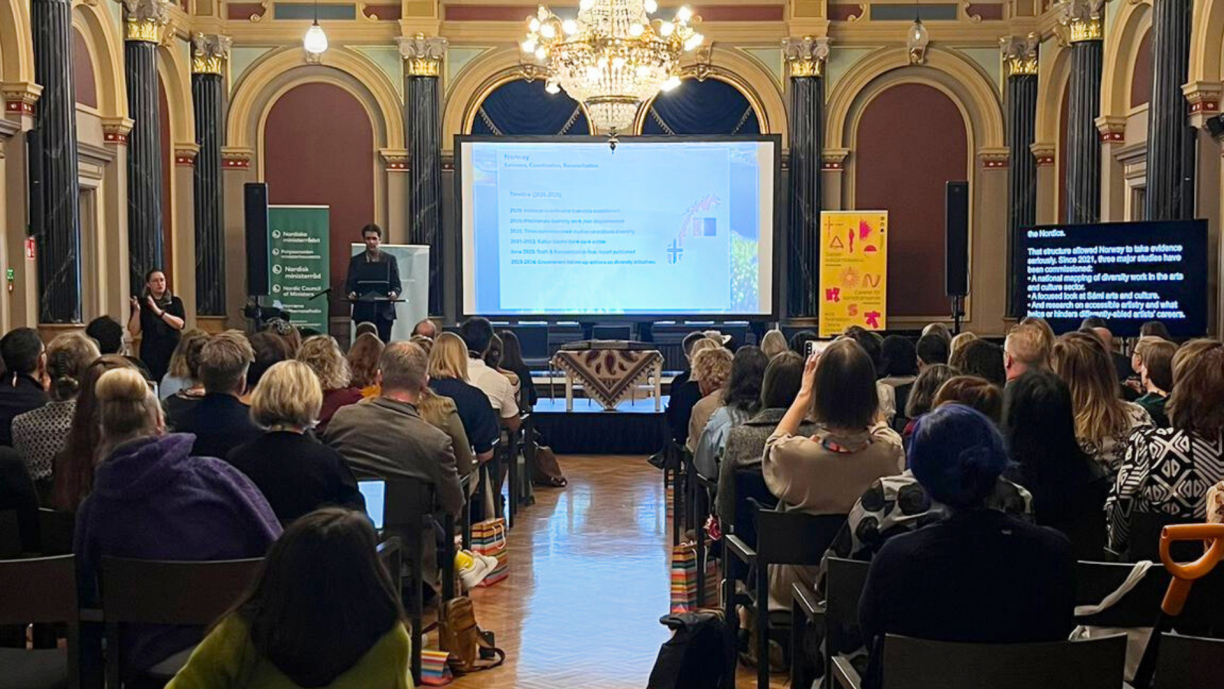Arts and culture professionals gather in Oulu to discuss cultural diversity themes

The seminar was organised by the Finnish Ministry of Education and Culture in cooperation with the Arts Promotion Centre Finland (Taike), the City of Oulu, Oulu2026, the Culture for All service and Globe Art Point. A wide international collaborative network also participated in the preparations for the seminar, which was part of the Programme for Finland’s and Åland’s Presidency of the Nordic Council of Ministers in 2025.
The seminar was hosted by sign language actor Silva Belghiti, and opening speeches were delivered by Mari-Leena Talvitie, Ari Alatossava and Piia Rantala-Korhonen.
The morning’s keynote speech presented a cross-country perspective on diversity efforts and gaps in the Nordic-Baltic region. Sadjad Shokoohi discussed the differences and similarities in diversity work between different countries, as well as how diversity work has progressed over the past five years in Norway, Finland, Sweden and Estonia. Ceyda Berk-Söderblom then discussed the importance of democracy and participation in culture. She emphasised that true democracy needs everyone, including minorities and marginalised groups.
The panel discussion presented perspectives from across the Nordic-Baltic region, including Åland, Iceland, Sweden, the Saami Council, Latvia and Lithuania. The panel members were Alyssa Bittner-Gibbs, Elham Fakouri, Izabel Nordlund, Gražina Sluško and Lība Bērziņa and the moderator was Ninos Josef.
The discussions highlighted the need to continue collaboration and remove structural barriers in the arts sectors of different regions. In addition, the panel members discussed how diversity work resonates in different contexts, what perspectives might be missing, and how non-discriminatory cultural practices can be promoted.
The seminar work involved participatory solutions-oriented practices for arts and culture that encouraged seminar participants to reflect and discuss together. The parallel sessions on Tuesday focused on five main topics:
- Privilege and Access in Arts Education
- Data, Research, and Cultural Policy
- Leadership, Power, and Gatekeeping in the Arts
- Equitable and Accessible Arts Funding
- Art and Technology in an Equitable Creative Economy
Critical Friends Finland – advisory group on diversity
In the afternoon, a Reflection Plenary was hosted by Critical Friends Finland (CFF), an advisory group comprising eight arts and culture practitioners based in Finland, representing a diverse range of artistic expressions, cultural backgrounds and personal experiences. Its members bring expertise in areas such as cultural diversity, social sustainability and critical issues, including race, gender, accessibility and human rights.
Moderated by Kemê Pellicer, the panel discussed what diversity means in practice and how the arts sector could become truly inclusive. The panel members included Isa Hukka, Julian Owusu, Monica Gathuo, Ritni Ráste Pieski and Päiviö Maurice Omwami.
The discussions addressed such issues as the role of art in social change, barriers to cultural accessibility, and the significance of equitable practices in the cultural sphere. The panellists emphasised the idea of continuous learning and structural change: diversity is not built on the basis of projects but rather as the outcome of long-term work.
The group's expertise will be utilised more extensively in the development work of Taike and its successor, the Finnish Arts and Culture Agency.
“It is important to consider how diversity and equality will be ensured in the decision-making of the new Finnish Arts and Culture Agency, as well as in the composition and work of its grant assessment panels. These are areas in which Critical Friends Finland can support the agency's internal preparations,” says Henri Terho.
The closing remarks for the seminar were delivered by Minna Karvonen, who highlighted the importance of diversity and equality work. Videos and other materials from the seminar will be published later on the Ministry of Education and Culture website.
